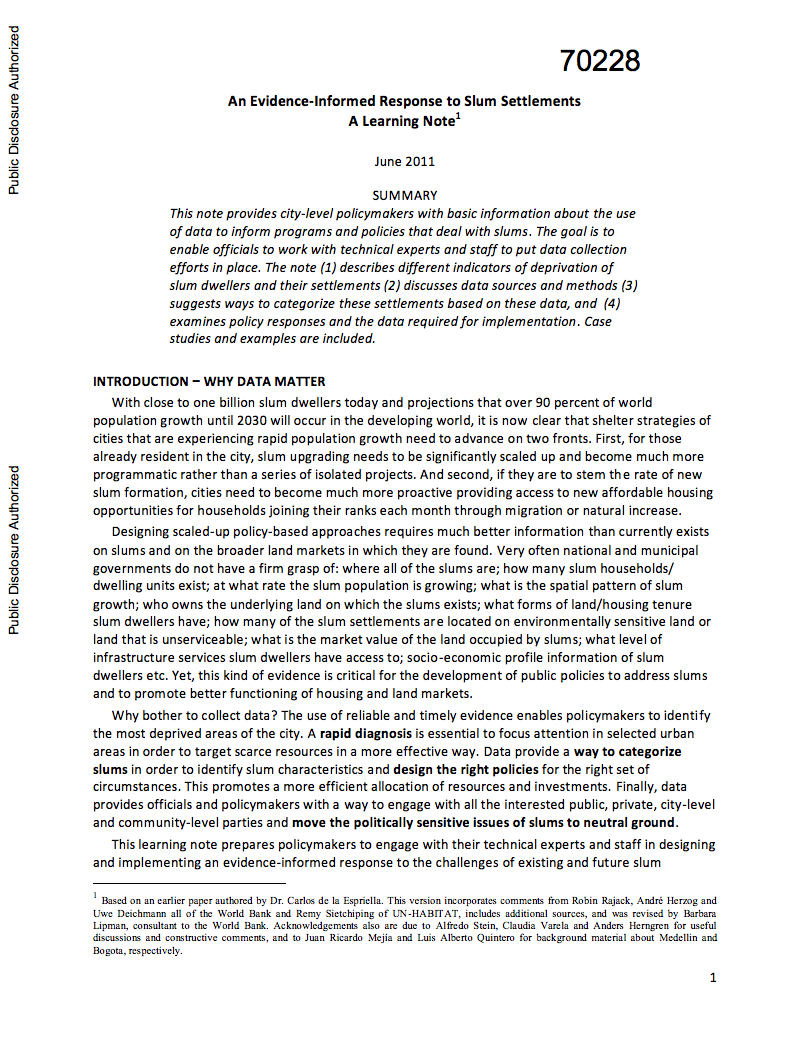The World Bank is a vital source of financial and technical assistance to developing countries around the world. We are not a bank in the ordinary sense but a unique partnership to reduce poverty and support development. The World Bank Group has two ambitious goals: End extreme poverty within a generation and boost shared prosperity.
- To end extreme poverty, the Bank's goal is to decrease the percentage of people living on less than $1.25 a day to no more than 3% by 2030.
- To promote shared prosperity, the goal is to promote income growth of the bottom 40% of the population in each country.
The World Bank Group comprises five institutions managed by their member countries.
The World Bank Group and Land: Working to protect the rights of existing land users and to help secure benefits for smallholder farmers
The World Bank (IBRD and IDA) interacts primarily with governments to increase agricultural productivity, strengthen land tenure policies and improve land governance. More than 90% of the World Bank’s agriculture portfolio focuses on the productivity and access to markets by small holder farmers. Ten percent of our projects focus on the governance of land tenure.
Similarly, investments by the International Finance Corporation (IFC), the World Bank Group’s private sector arm, including those in larger scale enterprises, overwhelmingly support smallholder farmers through improved access to finance, inputs and markets, and as direct suppliers. IFC invests in environmentally and socially sustainable private enterprises in all parts of the value chain (inputs such as irrigation and fertilizers, primary production, processing, transport and storage, traders, and risk management facilities including weather/crop insurance, warehouse financing, etc
For more information, visit the World Bank Group and land and food security (https://www.worldbank.org/en/topic/agriculture/brief/land-and-food-security1
Resources
Displaying 2706 - 2710 of 4907Kenya's Tourism : Polishing the Jewel
Kenya's tourism product lines and
its source markets function in a cross-sectoral context,
which leads to cross-cutting public and private sector
issues. Tourism has played a major role in Kenya's
development despite economic jolts from time-to-time by
internal and external shocks. In 2006 and 2007 the economy
grew rapidly and tourism, after a jolt in early 2008,
rebounded thanks to market conditions and some solid
An Evidence-Informed Response to Slum Settlements : A Learning Note
This learning note prepares policymakers
to engage with their technical experts and staff in
designing and implementing an evidence-informed response to
the challenges of existing and future slum settlements. To
that end, the note discusses a set of indicators and data
analysis techniques needed in the identification and
characterization of slums as well as relevant lessons and
examples. In addition, the noted discusses the data
Local Government Discretion and Accountability : Application of a Local Governance Framework
This report evaluates the framework of
decentralization reforms instituted in decentralizing
countries. Decentralization is a multi-faceted process which
includes giving discretion to local governments and
establishing accountability mechanisms at three different
levels of governance: political, administrative and fiscal.
Therefore, the analysis of the decentralization reforms
should also be based on an inter-disciplinary approach. The
Solid Waste Management Holistic Decision Modeling
This study provides support to the
Bank's ability to conduct client dialogue on solid
waste management technology selection, and will contribute
to client decision-making. The goal of the study was to
fully explore the use of the United States Environmental
Protection Agency and the Research Triangle Institute
(EPA/RTI) holistic decision model to study alternative solid
waste systems in a wide array of waste management
Improving Water Management in Rainfed Agriculture : Issues and Options in Water-Constrained Production Systems
Due to climate change and increasing
food prices, emphasis needs to be placed on addressing water
management as a key determinant for agricultural production
and productivity. However, governments and donors have
tended to pay relatively little attention to this area, and
investments remain low. This report, which is based on
economic and sector work carried out in the Water Anchor of
the World Bank, highlights the importance of improving water







